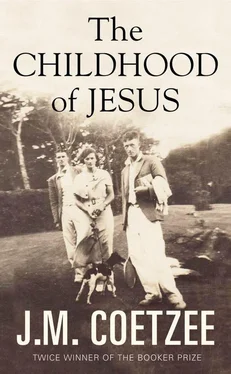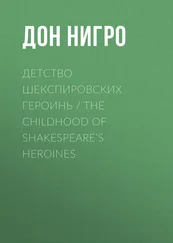‘No, a school for the younger children. A school before proper school.’
‘Sorry, I can’t help you.’ Eugenio rises. ‘Time to get back to work.’
The next day, just as the whistle blows for the lunch break, a stranger comes riding up on a bicycle. With his hat, black suit and tie he looks out of place on the quayside. He dismounts, greets Álvaro familiarly. His trouser-cuffs are pinned back with bicycle clips, which he neglects to remove.
‘That’s the paymaster,’ says a voice beside him. It is Eugenio.
The paymaster slackens the straps on his bicycle rack and removes an oilcloth, revealing a green-painted metal cashbox, which he sets down on an upended drum. Álvaro beckons the men over. One by one they step forward, speak their names, and are given their wages. He joins the end of the line, waits his turn. ‘Simón is the name,’ he says to the paymaster. ‘I am new, I may not be on your list yet.’
‘Yes, here you are,’ says the paymaster, and ticks off his name. He counts out the money in coins, so many that they weigh down his pockets.
‘Thank you,’ he says.
‘You’re welcome. It’s your due.’
Álvaro rolls the drum away. The paymaster straps the cashbox back on his bicycle, shakes hands with Álvaro, dons his hat, and pedals off down the quay.
‘What are your plans for the afternoon?’ asks Álvaro.
‘I have no plans. I might take the boy for a walk; or if there is a zoo, I might take him there, to see the animals.’
It is Saturday, noon, the end of the working week.
‘Would you like to come along to the football?’ asks Álvaro. ‘Does your young man like football?’
‘He is still a bit young for football.’
‘He has to start sometime. The game starts at three. Meet me at the gate at, say, two forty-five.’
‘All right, but which gate, and where?’
‘The gate to the football ground. There is only one gate.’
‘And where is the football ground?’
‘Follow the footpath along the riverfront and you can’t miss it. About twenty minutes from here, I would guess. Or if you don’t feel like walking you can catch the Number 7 bus.’
The football ground is further away than Álvaro said; the boy gets tired and dawdles; they arrive late. Álvaro is at the gate, waiting for them. ‘Hurry,’ he says, ‘they will be kicking off at any moment.’
They pass through the gate into the ground.
‘Don’t we need to buy tickets?’ he asks.
Álvaro regards him oddly. ‘It’s football,’ he says. ‘It’s a game. You don’t need to pay to watch a game.’
The ground is more modest than he had expected. The playing field is marked off with rope; the covered stand holds at most a thousand spectators. They find seats without difficulty. The players are already on the pitch, kicking the ball around, warming up.
‘Who is playing?’ he asks.
‘That’s Docklands in blue, and in red are North Hills. It is a league game. Championship games are played on Sunday mornings. If you hear the hooters sounding on a Sunday morning, that means there is a championship game being played.’
‘Which team do you support?’
‘Docklands, of course. Who else?’
Álvaro seems in a good mood, excited, even ebullient. He is glad of that, grateful too for being singled out to accompany him. Álvaro strikes him as a good man. In fact, all of his fellow stevedores strike him as good men: hard-working, friendly, helpful.
In the very first minute of the game the team in red makes a simple defensive error and Docklands scores. Álvaro throws up his arms and lets out a cry of triumph, then turns to the boy. ‘Did you see that, young fellow? Did you see?’
The young fellow has not seen. Ignorant of football, the young fellow does not grasp that he should be attending to the men running back and forth on the pitch rather than to the sea of strangers around them.
He lifts the boy onto his lap. ‘See,’ he says, pointing, ‘what they are trying to do is to kick the ball into the net. And the man over there, wearing the gloves, is the goalkeeper. He has to stop the ball. There is a goalkeeper at each end. When they kick the ball into the net, it is called a goal. The team in blue has just scored a goal.’
The boy nods, but his mind seems to be elsewhere.
He lowers his voice. ‘Do you need to go to the toilet?’
‘I’m hungry,’ the boy whispers back.
‘I know. I’m hungry too. We must just get used to it. I’ll see if I can get us some potato crisps at half-time, or some peanuts. Would you like peanuts?’
The boy nods. ‘When is half-time?’ he asks.
‘Soon. First the footballers must play some more, and try to score more goals. Watch.’
Returning to their room that evening, he finds a note pushed under the door. It is from Ana: Would you and David like to come to a picnic for new arrivals? Meet at noon tomorrow, in the park, by the fountain. A.
They are at the fountain at noon. It is already hot — even the birds seem lethargic. Away from the noise of traffic they settle beneath a spreading tree. After a while Ana arrives, bearing a basket. ‘Sorry,’ she says, ‘something came up.’
‘How many of us are you expecting?’ he asks.
‘I don’t know. Perhaps half a dozen. Let us wait and see.’
They wait. No one comes. ‘Looks like it is just us,’ says Ana at last. ‘Shall we start?’
The basket turns out to contain no more than a packet of crackers, a pot of saltless bean paste, and a bottle of water. But the child wolfs down his share without complaint.
Ana yawns, stretches out on the grass, closes her eyes.
‘What did you mean, the other day, when you used the words washed clean ?’ he asks her. ‘You said David and I should wash ourselves clean of old attachments.’
Lazily Ana shakes her head. ‘Another time,’ she says. ‘Not now.’
In her tone, in the hooded glance she casts him, he senses an invitation. The half-dozen guests who have failed to turn up — were they just a fiction? If the child were not here he would lie down on the grass beside her and then perhaps let his hand rest ever so lightly on hers.
‘No,’ she murmurs, as if reading his mind. The ghost of a frown crosses her brow. ‘Not that.’
Not that. What is he to make of this young woman, now warm, now cool? Is there something in the etiquette of the sexes or the generations in this new land that he is failing to understand?
The boy nudges him and points to the nearly empty packet of crackers. He spreads paste on a cracker and passes it across.
‘He has a healthy appetite,’ says the girl without opening her eyes.
‘He is hungry all the time.’
‘Don’t worry, he will adapt. Children adapt quickly.’
‘Adapt to being hungry? Why should he adapt to being hungry when there is no shortage of food?’
‘Adapt to a moderate diet, I mean. Hunger is like a dog in your belly: the more you feed it, the more it demands.’ She sits up abruptly, addresses the child. ‘I hear you are looking for your mama,’ she says. ‘Do you miss your mama?’
The boy nods.
‘And what is your mama’s name?’
The boy casts him an interrogative glance.
‘He doesn’t know her by name,’ he says. ‘He had a letter with him when he boarded the boat, but it was lost.’
‘The string broke,’ says the boy.
‘The letter was in a pouch,’ he explains, ‘which was hanging around his neck on a string. The string broke and the letter was lost. There was a hunt for it all over the ship. That was how David and I met. But the letter was never found.’
‘It fell in the sea,’ says the boy. ‘The fishes ate it.’
Читать дальше












